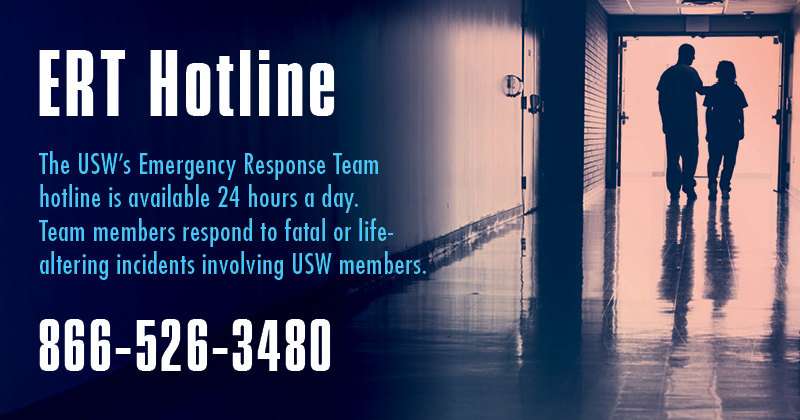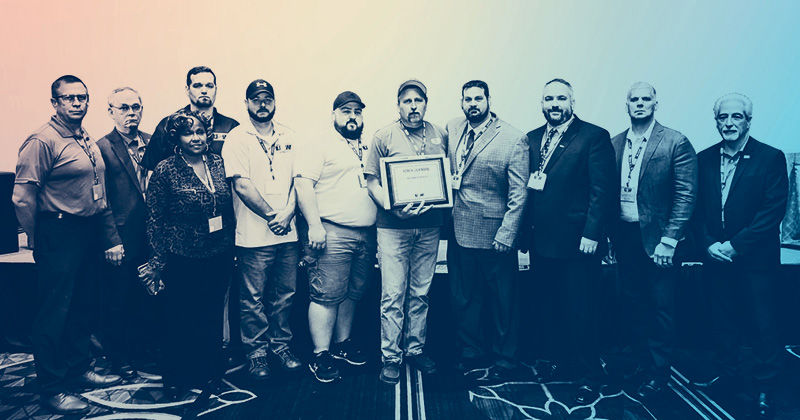The Best of Us: Emergency Response Team Helps Workers, Families After Devastating Events

The USW’s Emergency Response Team hotline is available 24 hours a day to respond to fatal or life-altering incidents involving USW members, at 866-526-3480.
Kenny Stitt was only 32 when he lost his life in a workplace tragedy on Oct. 12, 2021. He left behind a wife and two young kids, as well as hundreds of members of his extended USW family, who made sure that his spouse and his children would never have to face such a devastating loss alone.
In addition to his Local 1016 siblings, one of the first USW members to respond following Stitt’s death at the NLMK steel facility in Farrell, Pa., was Duronda Pope, who oversees the union’s Emergency Response Team (ERT).
Pope traveled to Mercer County, Pa., just across the Ohio border near Youngstown, to help with a number of important tasks – making sure family members and friends had all the food and housing they needed, providing them with information on legal assistance, stress and grief counseling, and, ultimately, simply offering a friendly face of a fellow USW member who could shoulder a piece of their burden.

“The program is one of a kind. Having an organization that responds to our members at this level is unheard of,” Pope said of the ERT. “It speaks on a high level to the character and integrity of the Steelworkers to have this program in place.”
Long History
The USW’s ERT program has existed in some form since the union’s merger with the Paper, Allied-Industrial, Chemical and Energy Workers International Union (PACE) in 2005. The program’s coordinators respond any time there is a fatal or life-altering event involving USW members.
At first “the program was much different than it is today,” said Allan McDougall, who led the ERT for 15 years, from the day that now-retired International President Leo W. Gerard tapped him following the 2005 merger until McDougall’s own retirement from the union in 2020.
“The USW is a union of substance,” McDougall said. “So, we wanted to have a program of substance.”
That means the union’s ERT coordinators don’t just show up the day after an incident and then go home. They work hard to build long-term relationships with workers and families and make it clear that they’re there to help for as much as a year.
“If you’re going to do a job, you should do it well,” McDougall said.
U.S. and Canada
The ERT has 62 volunteer responders throughout the United States and Canada. Through the ERT’s 24-hour call center, Pope receives information as soon as the union learns of an incident in a USW workplace, then decides on a response plan. Members of the ERT then travel to the site of the incident and get to work.
“The second visit can sometimes be more important than the first one,” McDougall said. “At first, we are just one in a sea of faces.”
That was the case for Tamara Taylor and Trina Benedict, two ERT coordinators who responded last fall following an explosion at an oil refinery in Newfoundland that injured eight workers, including a USW member who succumbed to his injuries six weeks later.
“There were eight people injured, so we knew it was going to be a big job,” Taylor said.
Because of the scale of the incident and the distance between the hospital and the workplace, Taylor and Benedict divided their ERT duties, with Taylor remaining at the hospital to assist families, while Benedict stayed close to the work site and aided members of the local.
“People go to work, and their families expect them to come home unharmed. Unfortunately, that’s not always the case,” Benedict said.
After their initial response, the pair returned a few weeks later at the request of the workers, to continue their efforts to help.
“They were all still in shock and didn’t really know our purpose at first,” Taylor said of the families. Often families assume that visitors they don’t know are company representatives, she said.
“Companies are going to try to protect themselves, and sometimes they are looking to lay blame,” she said. “We don’t want to see families taken advantage of.”
Families aren’t the only ones ERT volunteers are there to help. The team also works closely with local union members and sets up meetings for witnesses and co-workers following tragic events. If needed, the ERT refers people to professionals for further help with issues such as post-traumatic stress disorder.
Often Overwhelming
In the immediate aftermath of a tragedy, members say, the presence of employer attorneys and insurance company representatives can be overwhelming for families, and survivors may end up unknowingly signing agreements that can put them at a disadvantage if they decide to take legal action in the future.

In addition, family members often don’t know exactly how the USW works, so they initially can be skeptical even of union representatives. ERT coordinators, though, are trained in every aspect of their response, including body language and the psychology of grief, so they have the skills to prepare them for nearly every situation.
“I tell them I can be a voice for them in dealing with company management,” said Taylor, a member of Local 5795 in Labrador. “We try to take anything we can off their plate so that they can just focus on their families.”
That has included addressing issues like workers’ compensation, temporary disability benefits, insurance coverage, hotel reservations, rental cars, parking fees, pet care and more.
“A lot of what we do is just being there for them,” Benedict said.
Months after the refinery fire, Benedict and Taylor said, they are still in contact with the members and their families in Newfoundland.
Coping with Loss
Benedict, a member of Local 5319 who works as an airport screening officer in Halifax, Nova Scotia, has been a member of the USW for about 17 years. She lost her husband suddenly when he was only 39 years old and, without realizing at the time, that event started her along a path to helping others who were experiencing similar trauma.
“We’re seeing people at the lowest point in their lives,” she said. “When you’re at your lowest, you really rely on others around you to think for you, to do what needs to be done. That’s what the ERT is all about.”
Benedict, who also serves as a shop steward in her workplace, said being a part of the ERT helps to put her other union duties into perspective.
“The small things sometimes seem so trivial now,” she said. “Everything we do is important, but with the ERT, I’ve never been more proud to be a union member.”
Providing Strength
As the ERT has evolved over the years, its role has expanded from responding to the devastation of on-the-job injuries and deaths to other tragedies, such as workplace shootings, suicides and overdoses.

James Lonergan, a member of Local 9999 in Eastern Pennsylvania, said the most recent ERT call he received involved a member who lost his life. When he first arrived on the scene, he said, the family was slow to let him into their circle. But once they learned that he was there to help as a USW brother, they embraced him.
“I come here as a father. I come here as a son,” Lonergan said he told the family members. “I keep thinking about his dad and how overjoyed he was that someone went to that extent to help them.”
The ERT, Lonergan said, is one of the most important programs the USW offers – one that makes sure that members and their families know that someone always has their back, especially at the most desperate times in their lives.
“It’s important for members to know that they’re not by themselves, and we have the tools that they need to help them get through it,” he said. “When you’re in a position when you’re at your weakest, an ERT member is there to give you strength.”
‘Filling Your Cup’
Sometimes, it’s the ERT coordinators themselves who need to find strength. Responding to tragic events on a regular basis, they say, can take a heavy emotional toll, and taking time away from the program sometimes is a necessity.
As the ERT grew, the USW, along with Loyola University psychologist Dr. Jeffrey Lating, worked to develop a sabbatical program for participants so that members are able to take a mental and emotional break from the stress.
Benedict recalled, during her and Taylor’s response to the refinery fire, the pair took a half-hour for a quiet walk on the beach, watching the waves and looking for sea glass, just to take their mind away – for a moment – from the tragedy they and their USW siblings were facing.
“It’s about taking time to fill your cup,” she said. “Sometimes something as simple as that can help.”
The Work Goes On
No matter what time of day, or what day of the week, the ERT is always there to respond to members in need, Pope said. And the team’s work continues as long as families are suffering.
While Stitt’s tragic death at NLMK left his children without their father and his 28-year-old wife a young widow, the USW has continued to rally around the family.
Members of the local, led by District 10 Next Generation Coordinator Colton Smith, have remained in constant contact with the Stitt family. Through various fundraisers, the local union has collected more than $110,000 and has plans to establish a scholarship fund for Stitt’s children.
The USW also presented the local union with the Karen Silkwood Award, given in recognition of members who build solidarity through health, safety and environmental activism.
“The local made it known that that family would never be alone,” said District 10 Director Bernie Hall. “They really represent the best of us, of what our union is all about.”

By clicking Sign Up you're confirming that you agree with our Terms and Conditions.
Recent News Articles
Want to Learn More?
See how the USW is making a real difference in our communities and our workplaces.

